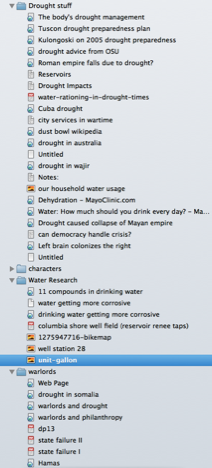Our Research Notes series invites authors to describe their research for a recent book, with “research” defined as broadly as they like. This week, Ben Parzybok writes about Sherwood Nation from Small Beer Press.
+
 Sherwood Nation takes place in a post-collapse Portland, Oregon. The mayor of the city is still in charge of this dwindling city, and because of an extreme, prolonged drought, all water is rationed and distributed. In the midst of this, an activist becomes a folk hero and uses her sway to secede a section of the city to run as her own nation, an enclave within the city.
Sherwood Nation takes place in a post-collapse Portland, Oregon. The mayor of the city is still in charge of this dwindling city, and because of an extreme, prolonged drought, all water is rationed and distributed. In the midst of this, an activist becomes a folk hero and uses her sway to secede a section of the city to run as her own nation, an enclave within the city.
There were no end to the topics that needed research: Tunnels and tunnel building, droughts, water distribution, city politics, enclaves, the National Guard, warlords, activists, secession movements, the economics of communities — even video games. At right is a partial screenshot of some of the research materials I archived in Scrivener, my novel-writing tool of choice.
 Researching droughts was fascinating, because they’re everywhere. They’re cyclical and devastating, and they are a type of natural disaster that happens in slow-motion, creating an entirely different kind of stress on a place than just about any other crisis. I spent a lot of time reading historical accounts of the Dust Bowl, when essentially our land-depleting farming techniques in combination with a drought caused one of the worst natural disasters in our history. 100,000,000 acres were affected, and up to 500,000 thousands people were left homeless. The book was written pre-California and whew, boy. Every time I read about a culture-changing drought I was all sweet! This is totally going to work. And then I’d talk to a local hydrologist who would tell me that there’s “no way we could have a drought like that in the Pacific Northwest.”
Researching droughts was fascinating, because they’re everywhere. They’re cyclical and devastating, and they are a type of natural disaster that happens in slow-motion, creating an entirely different kind of stress on a place than just about any other crisis. I spent a lot of time reading historical accounts of the Dust Bowl, when essentially our land-depleting farming techniques in combination with a drought caused one of the worst natural disasters in our history. 100,000,000 acres were affected, and up to 500,000 thousands people were left homeless. The book was written pre-California and whew, boy. Every time I read about a culture-changing drought I was all sweet! This is totally going to work. And then I’d talk to a local hydrologist who would tell me that there’s “no way we could have a drought like that in the Pacific Northwest.”
But it’s my manuscript, and sometimes you decide to break the rules a little. So while the drought is realistic, it does not take into account that the mountains of the Pacific Northwest are essentially bottomless wells. One hydrologist suggested that only if the super volcano at Yellowstone blew, could we have a situation like I’d painted. So: yes to talking to real experts, and no to taking all of their advice.
I am already a fervent fan of history, and so it was with a particular joy that I began to comb back through history to study collapses, and especially what happens after a collapse. That’s the key. Because while the book is set within a post-collapse period, inside of that, there’s a semi-Utopian society being built. How do building projects work, when you’re making up all the rules? Are there taxes? What are the mechanics of an internal defense force. How do you guide them to be of the people and for the people. How do you inspire rapid social change without seeding violence. What does a dictator really do?
The most interesting kind of research is when you go searching out the mechanics of something, and what you learn actually changes the book. This happened with my discovery that the term ‘dictator’ did not originally have a negative connotation. It was a respected title in ancient Rome for someone who took reins of the government in a time of crisis. At this point, I was writing a different book — about how a community as a whole handled crisis, and the individual stories within that. But this re-defining of ‘dictator’ led me on a long journey of looking at how crises were managed — and that’s when I stumbled on this passage from James Lovelock (founder of the Gaia theory and a climate change activist) where he states:
Even the best democracies agree that when a major war approaches, democracy must be put on hold for the time being. I have a feeling that climate change may be an issue as severe as a war. It may be necessary to put democracy on hold for a while.
Certainly a radical thought, and in the deep crisis I was fabricating, I wanted to play out this idea in the book. That what might make the most interesting book is for my characters to secede from the ill-run city about them, to handle better the urgent issues: security, food and water, and medical attention. And thus, Sherwood Nation was born.
+++